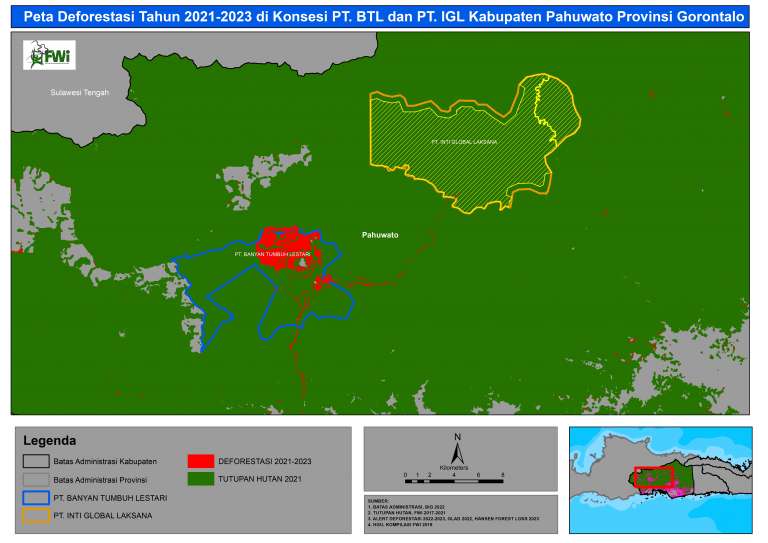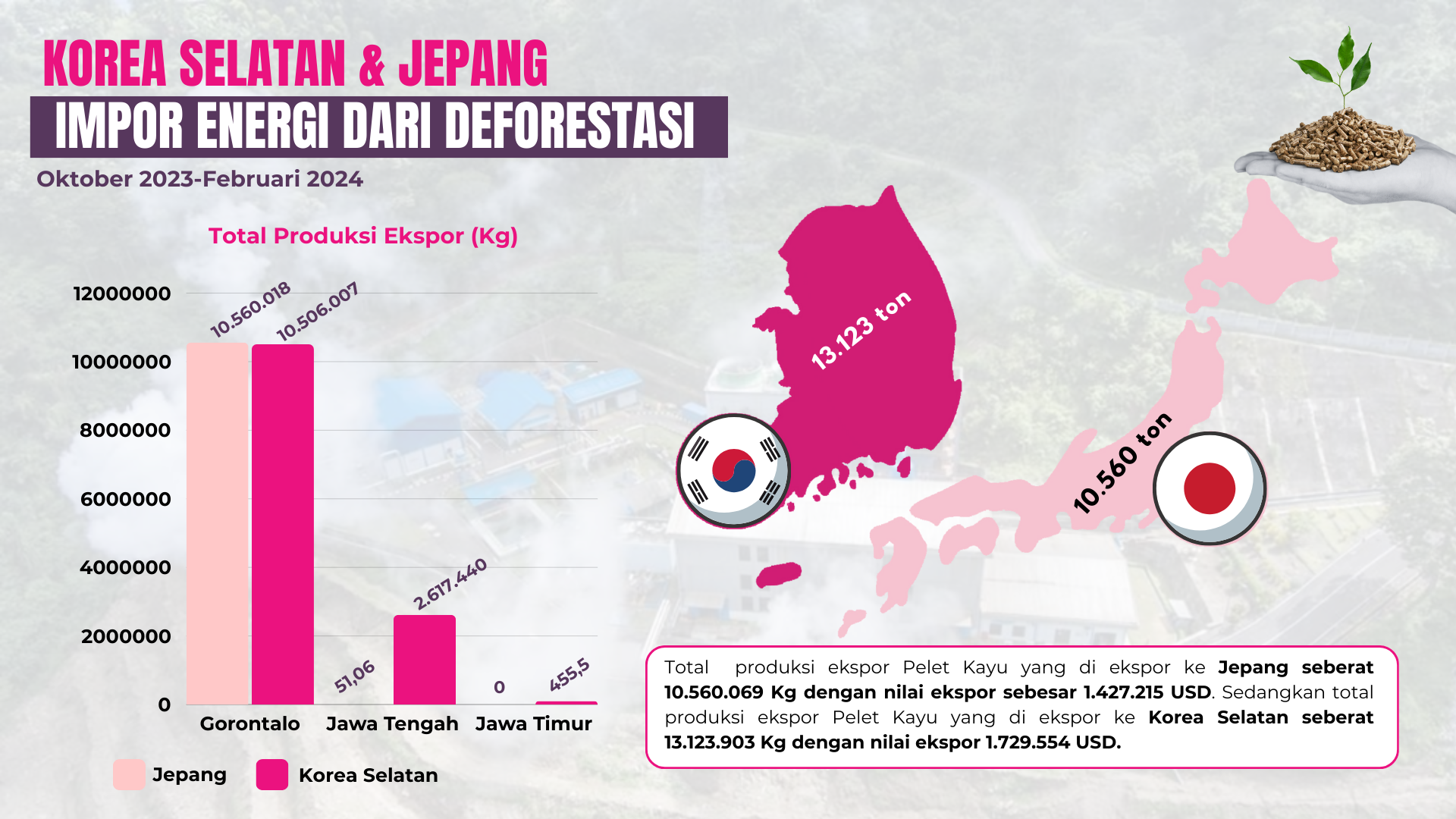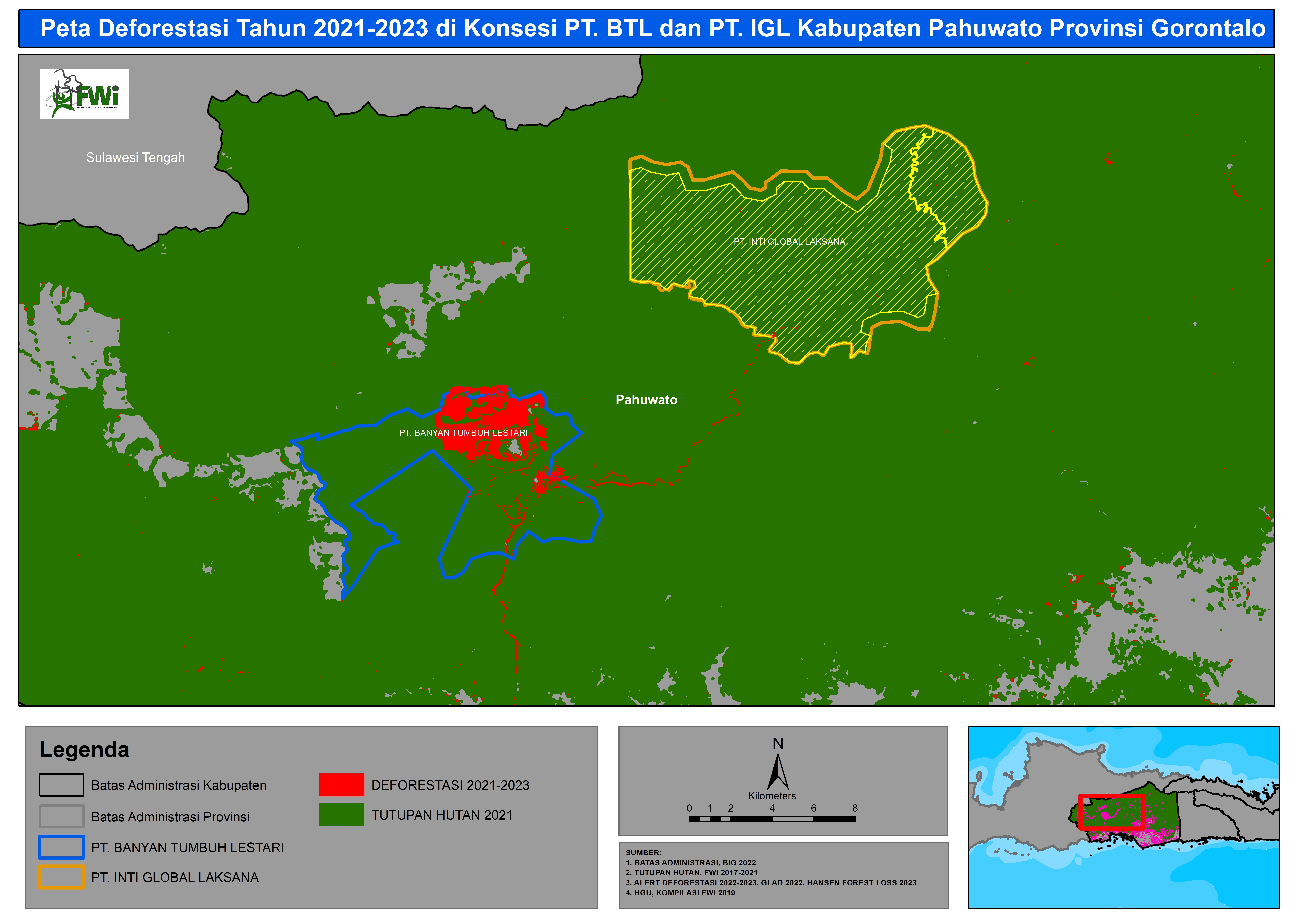Jakarta, 23 March 2024. Gorontalo Forest, with its abundant natural resources, holds great potential for economic development and community welfare. However, behind this great potential, there is a hidden threat that needs serious attention, called planned deforestation.
FWI mentions that Gorontalo Province experienced deforestation (2017-2021) of 33,492 hectares. Meanwhile, there are still 696,631 hectares of natural forest left in Gorontalo that need to be maintained amidst the development pressures with various interests that require quite a lot of land.
Renal Husa, member of the Jaring Advokasi Pengelolaan Sumberdaya Alam or Natural Resources Management Advocacy Network (Japesda) explained that natural forest deforestation in Gorontalo was the most severe in Pohuwato, North Gorontalo, and Bone Bolango Regencies. Land conversion is often aimed at mining, corporate plantations, and palm oil plantations, which then encourages deforestation.
Renal also revealed that several land conversions also occurred in conservation areas and protected areas such as the Panua Nature Reserve, Tanjung Panjang Nature Reserve, Bogani Nani Wartabone National Park, and Nantu Forest Wildlife Reserve. At least around 62 percent of shrimp and milkfish ponds in Pohuwato Regency are located in protected forest areas.
Energy Transition as a New Driver of Deforestation
On the other hand, amid an action commitment to reduce national emissions through the energy transition, it encourages massive new deforestation despite the intention of achieving the Net Zero Emission target by 2060.
The findings of FWI (2024) show that the deforestation trend in Gorontalo, specifically in Pohuwato Regency, is significant and looks massive in the period 2021 to 2023. Deforestation occurs within the PT (BTL) concession with an area of around 1,105 hectares. PT BTL based on the Decree of the Minister of Environment and Forestry (LHK) Number 01 of 2022 in Attachment I and Attachment II is an oil palm plantation company that has obtained permit bleaching.
The results of FWI’s search from October 2023 to February 2024 on the Legality and Sustainability Information System (SILK) of the Ministry of Environment and Forestry reached conclusions regarding wood pellet export data from Indonesia, showing that Pohuwato Regency had exported wood pellets with a total production of 21,066,025 kg with a value of 2,833,380 USD.


(Total export production of wood pellets exported to Japan weighed 10,560,069 kg with an export value of 1,427,215 USD. Meanwhile, the total production exported to South Korea weighed 13,123,903 kg with an export value of 1,729,554 USD.)
PT Biomasa Jaya Abadi (BJA) is currently listed as the only company in Pohuwato Gorontalo that exports wood pellets to 2 main countries, Japan and South Korea. PT BJA is suspected to have been formed by the company PT BTL which is also a regional provider to meet the raw material needs of the wood pellet industry. Both in Indonesia, Japan, and South Korea, wood pellets are used as a fuel substitute for coal in power plants as a way of energy transition.
Post Permit Bleaching
Apart from PT BTL, there is another palm oil plantation company that also received a permit for bleaching in Pohuwato Regency from the Ministry of Environment and Forestry, namely PT Inti Global Laksana (IGL). Through Decree Number 566/MENHUT-II/2011 PT IGL received an earlier permit bleaching than PT BTL. PT IGL and PT BTL are palm oil plantation companies that are also suspected of being the masterminds behind the operationalization of the wood pellet industry by PT BJA in Pohuwato Regency.
Even though both companies operate in the oil palm plantation business, based on FWI’s spatial analysis of permits (2024), only PT IGL has an HGU (Right to Cultivate) permit. Meanwhile, PT BTL is not yet known to have obtained an HGU (Right to Cultivate) permit.
Based on the Walhi Coalition report (2023), the two palm oil companies that had received permits for bleaching from the Ministry of Environment and Forestry changed the type of commodity business in the field. Both PT IGL and PT BTL have built a wood pellet processing industrial factory and planted Kaliandra and Gamal. These two types of plants are known as energy plants as green biomass, raw material for wood pellets.
Unfortunately, the working areas of both companies stand on natural forests so that the development of energy plantations (read; energy plantation forests) will not be separated from land clearing and deforestation efforts. There are at least 17.70 thousand hectares of natural forest in the two concessions that are planned to be destroyed (planned deforestation) to meet the need for wood pellet exports to Japan and South Korea.
Wood Biomass and Renewable Energy Idle Talks in the Energy Transition
Indonesia needs wood biomass of at least 8 to 14 million tons of wood pellets every year, to replace coal energy in a portion of 5 to 10 percent in Steam Power Plants (PLTU). Wood biomass will be fulfilled by efforts to develop energy plantation forests or energy plantations. The Ministry of Environment and Forestry labels all plantation forest development as forest rehabilitation with rotation.
Anggi Putra Prayoga, Campaign Manager, Advocacy, Media FWI regrets the implementation of the development of energy plantation forests and energy plantations by companies which so far have always involved forest clearing (land clearing). Not rehabilitation on critical land as advertised. Companies (plantations and forestry) always pocket natural forests in their concessions. Therefore, deforestation of natural forests cannot be avoided in fulfilling the raw material for wood biomass.
Wood biomass as energy (bioenergy) should not be included in renewable energy and any scheme in the energy transition. The occurrence of deforestation in fulfilling wood biomass raw materials is always accompanied by the release of emissions that move away from the emission reduction targets from the forest & land use and energy sectors.
The energy transition by utilizing wood biomass will encourage massive deforestation of natural forests in the future. Apart from meeting domestic needs, the use of wood biomass also stimulates the export market, especially in Japan and South Korea. These two countries control wood pellet commodities from Indonesia with a total of 23,683,972 kg over the last 5 months. This has led to increasingly uncontrolled forest clearing in Indonesia, said Anggi.
Contact person:
FWI Media (WA +62 857-2034-6154)
The Press Release document can be accessed at the following link:




